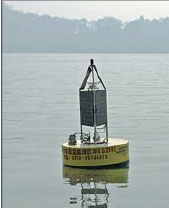With the help of 1,800 sensors, the Wuxi Environmental Protection Bureau manages to monitor 30,800 factories across the city that produce pollution.
More than 30,000 pieces of information concerning about 100 kinds of pollutants are sent from the sensors to the bureau on a daily basis, which enables it to learn about changes in the city's air, water and soil quality.
The sensors, installed after the bureau initiated an internet of things program, enable monitoring from afar.
"Special software has been designed for analyzing the collected data," said Tang Hao, general manager of Wuxi High-Tech IoT Development Co. "The data analysis can show emissions of pollutants, management conditions and environmental quality clearly."
"One type of software can release the results of the analysis to the public on the internet immediately and enables interaction with people," Tang said.
"Other software allows environmental workers to deal with the pollution directly, and enables users to acquire the whole picture of the city's pollution," Tang said.
Through the program, the air quality of every area of the city, from any time of day, can be seen. It can also offer air quality forecasts for up to 72 hours to the public.
 |
|
One of the buoys powered by solar energy on Taihu Lake in Wuxi. With seven sensors, it can send the environmental data it collects, including algae intensity, back to local authorities for analysis. Lu Yi / For China Daily |
According to the environmental protection bureau, the program can predict air quality for the next five days, but to ensure accuracy, only the next 72 hours' forecasts are released to the public.
"Experts can rely on the data collected by the program to draw conclusions and make decisions," said Tang. "As people are paying more and more attention to air pollution, the program will play an important role in their lives.”
According to the company, one of the problems in dealing with air quality is that sources of pollutants can hardly be traced. But with the program's help, professionals can tell what kinds of pollutants come from which factories, and then locate the companies discharging the pollution.
The program also monitors the water quality of Taihu Lake, one of the five largest freshwater lakes in China, and the growth of cyanobacteria, also known as blue-green algae.
Since May 2007, when a severe outbreak of algae broke out in the city's water supply, the toxic algae has become the main problem for the lake that provides water to more than 6.5 million people.
Now environmental workers can compare the data collected from different areas of the lake at different times, and view all the data on the same screen for reference.
Financed by the Ministry of Industry and Information Technology, the program can be promoted to other cities. It has been recommended by the Ministry of Environmental Protection and the National Development and Reform Commission.